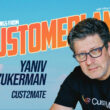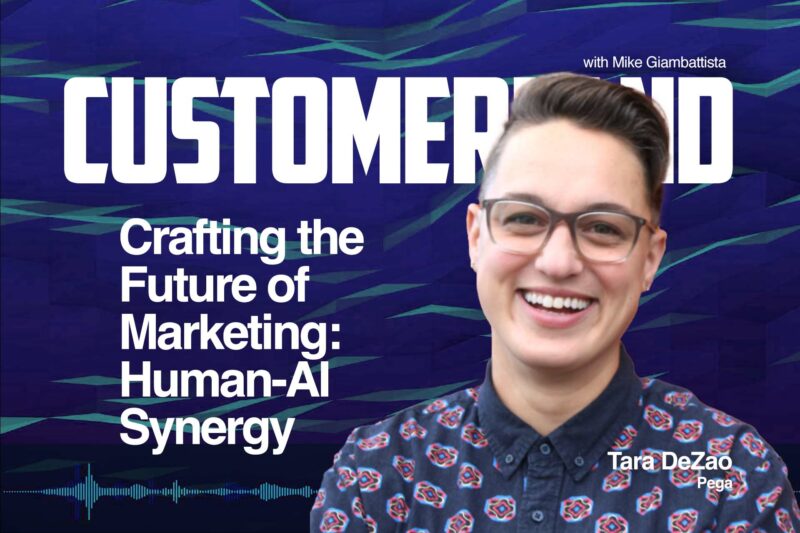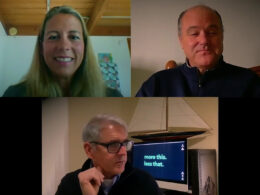Explore the evolving role of human-AI collaboration in marketing with Tara DeZao, Product Marketing Director at PEGA, specializing in AdTech and MarTech. Tara discusses the intricate interplay between AI and human creativity, focusing on the AI’s impact on enhancing customer experiences. The conversation delves into critical issues of trust and transparency in AI, examining how a company’s approach to data ethics influences not only customer relations but also the integrity of their marketing strategies.
This episode provides a detailed look at the sophisticated interactions between brands and intelligent technologies, highlighting the importance of combining machine precision with human creativity in developing effective marketing stories.
We discuss the important ethical considerations of AI in marketing and the irreplaceable role of human storytelling in producing genuine content. As the advertising technology sector prepares for changes in conventional advertising techniques, this episode serves as a guide for those seeking to remain at the forefront, offering comprehensive knowledge on using AI ethically to enhance customer engagement and loyalty.
This episode is sponsored by

Read the full transcript below
Tara DeZao
I think too, one thing that gets overlooked all the time, and I understand why people are afraid. For sure, but nothing to me is going to replace human creativity. You just can’t do it. I mean, I know you can program tone and brand guidelines into GenAI, but when you think of how wonderfully creative some of our marketers and advertisers are, GenAI is never going to replace that. I think the best use is for it to augment right To make the parts of marketing and customer engagement that bum us out, that burn us out easier. It’s when you’re staring at that blank page for 25 minutes, getting your mind moving, not speaking for you [“Mind Blank Page”].
Mike Giambattista
Welcome back to Customer Land. Today I have the honor of talking with Tara DeZao, who is Product Marketing Director of AdTech and MarTech, and I just want to let that hang in the air for a minute, because that is a big, big remit at PEGA. It’s just so much to talk about just because of what you do for a living. But, Tara, thanks for joining me. I really appreciate it.
Tara DeZao
Thanks for having me, Mike. I appreciate you saying my full, really long title. I’ve had thoughts of shortening that over the years but it’s really hard to encapsulate both of those things together.
Mike Giambattista
Right, well, I’m one of your kin because I have a problematic last name as well, so Awesome. So maybe give us a bit of a description of what you do at PEGA, because Product Marketing Director of AdTech and MarTech is a lot of stuff.
Tara DeZao
Yeah, for sure.
Mike Giambattista
And then we can kind of jump in because I know we’ve got a handful of topics we want to address, but maybe what you do as context for the conversation.
Tara DeZao
Absolutely so. I’m in the group that works on the Customer Decision Hub product and it’s an AI-powered decisioning tool that helps brands make their customer experiences amazing and it adds a layer of AI to our already existing or replacing how we connect with our consumers across channels. And I think that the way that I sort of fit in is through thought leadership around advertising technology and MarTech marketing technology, Because with MarTech I think we think of it as one thing A lot of people may call it customer relationship management but there’s also this other side, this AdTech side, that has a whole ecosystem and rich life that’s happening behind the scenes that we’ll probably talk about later, and actually the two are just really connected. So it’s my job to help educate those external and internal to PEGA on what’s happening in those industries and how our product best fits in to handle those problems and challenges.
Mike Giambattista
I’m adding to my Christmas wish list here, and that is that you and I figure out ways to speak more frequently, because your job description is an exact mirror of our editorial mandate.
Tara DeZao
Oh great.
Mike Giambattista
Yeah, so we have a lot to talk about here.
Tara DeZao
That would be great.
Mike Giambattista
But we had a little exchange before this conversation. It mapped out some of the higher level, more calm key things that you’re looking at in terms of predictions and how companies and technology providers in particular will deal with them. One of them is all over the news and I wonder if it’s just not like the hype cycle of the news looking for something that headline worthy. But there does seem to be a lot of buzz around the topics related to AI and trust and I know you’ve got some thoughts there.
Tara DeZao
Yeah, absolutely. I mean, I think there’s kind of two layers right. There’s the trust of the organizational leaders and then trust from consumers. You can’t really be doing something in the background that consumers don’t trust because, as we’ve seen with the data breaches and such in the past several years, customers want to know what’s going on. They want you to respect their privacy.
I think, where it relates to organizational leaders and customer engagement and marketing practitioners, AI we’re relying on it, especially when you have adaptive AI which basically will take a look and say, okay, there’s Mike, I’m reading his behaviors and preferences and how he’s moving through all the different channels and I’m going to serve him some content that’s really relevant to him in this moment. And in order to be able to do that, the organizational leader has to trust that the AI is going to do its job and do it well. And I think that as marketers for a long time, we’ve been really prescriptive about which channel we’re going to talk to our customers in. We might have campaigns that are static and not always on, and I think that until we get to a point where business leaders feel comfortable letting the AI out there to do its job and react to data and do the things that we need it to do and make our lives easier, make our interactions more relevant, they’re not going to get the full value out of their tech stocks and their applications.
Mike Giambattista
I’d love for you to correct me in my perspective here, but it seems to me that the AI trust paradigm, if you will, is just the natural extension of the privacy issues that companies and regulators and the consuming public have been wrestling with for you know what a decade, or maybe a little less than that, yeah absolutely.
Tara DeZao
It’s a natural extension because really, ai is just as good as the data that we put into it, right? So any problems that we have with our data whether that’s, you know, risk management we’re not respecting consumer privacy. There’s bias in our data. It basically, if you think about JANAI, that reflects to us the biases that are in the internet, right? So AI basically just does exactly what we tell it to do. It learns and it takes instructions really well. So if we’re putting negative instructions in, we’re going to get negative outcomes out.
Mike Giambattista
Right, right, I saw something. In fact, it was just this morning, and I’ll misquote who this was. I just can’t remember off the top of my head, but somewhat some high profile tech person. It occurred to me at the moment we hang up on this conversation, but basically was like hey, listen, I don’t know what the big deal is about the fear of AI taking over the world. It’s basically a marionette, you know, it dances to our tune. We get to tell it what to do, and I’m not sure I believe that entirely, but for a moment it did a pretty good job of quelling fears. I mean, the chatter around that comment was like oh well, I guess it’s a neat perspective, and if we can keep a lid on this thing just seems to be the big. If, then, we’re all going to be fine.
Tara DeZao
Yeah, I mean that mostly we assume that people have really good intentions and that if bias sneaks into their AI algorithms that it’s sort of accidental. But you know there are bad intentions out there, right, and one of the ways that we can kind of quell and curb those is through regulation. You’ll see that the EU is passing the Artificial Intelligence Act right now to curb some of the more nefarious uses of AI. And it’s really hard in the US to do the same because we have 50 states that act like little countries, right.
Mike Giambattista
Fiefdoms? Yeah, don’t get us started.
Tara DeZao
So I think it’s a combination of having the culture at your organization that is committed to ethical and responsible AI regulation, and I think you know we do have a little bit of like Hollywood sensationalism doomer-ness out there, and the fear is that is when the AI systems learn to talk to each other, and I think we’re pretty far off from that. But it is something that we need to be aware of and we need to be working. We need to be out in front of it and not just the big players, right, all of the organizations that are using AI.
Mike Giambattista
Yes, I’m nodding my head in agreement. There’s clearly no argument there. As somebody who sits on the content side of things, gen AI is already a huge help to us in doing research, in doing forecasting and planning and the content that we’re going to be using. But you know Gen AI is turning out to be let’s just take you know it’s creating its own trust issues within the media and publishing world.
Tara DeZao
Oh, sure, yeah there’s-.
Mike Giambattista
Do you really know if this is real? Is it garbage, whether to come from a human with real expertise, or what is this?
Tara DeZao
Yeah, I mean, I think it’s multiple things right With Gen AI. Again, what’s happening with Google? And they’re in a copyright lawsuit right now we’re figuring out. You know, is it ethical to train our AI systems on copyrighted material? That hasn’t been answered yet. But you know, organizations need to test themselves and say, hey, do we have an appetite for doing this? Is it within what our corporate ethics are?
TRIFFT is Smart Loyalty
As of today there are 1237 technologies on G2 listed as Loyalty platforms. There are 560 loyalty technologies on Capterra. My question is – how do you navigate all that?
The answer – if you’re an enterprise-level user – is that there are a handful of organizations out there that are happy to help you figure that out. But if you’re a mid-market user … well, good luck.
There’s a massive pool of options, features, integrations, stack-dependencies and complications – an almost innumerable amount of stuff to sort through just to arrive at some sort of short list.
That was the thinking behind Trifft. Trifft – T R I F F T is a smart loyalty platform designed from the ground up to provide mid-market retail and restaurant operators with a full-featured yet easy to use loyalty solution.
It was built by a team of loyalty veterans who saw that while platform sales were going up, usage and adoption were stagnant because the technologies were:
Too complicated
Had too many features
Needed too much manpower
Required too much IT input, etc etc etc.
Trifft’s entire reason for being is to help mid-market businesses deliver on their complex loyalty strategies without the tech bloat that so often accompanies such things.
That’s Trifft. Smart Loyalty. Trifft. T R I F F T. I O
Tara DeZao
How wonderfully creative some of our marketers and advertisers are. Genai is never going to replace that. I think the best use is for it to augment right To make the parts of marketing and customer engagement that bum us out, that burn us out easier. It’s when you’re staring at that blank page for 25 minutes, getting your mind moving, not speaking for you, and I think that culturally, we need to really see what we value. I personally think that, at least in the creative community, leaders value creativity more than productivity. There’s a place for both, and I think we just need to understand that we can use this as a tool versus it’s meant to replace our skill sets.
Mike Giambattista
I’m looking forward to the next conversation on that topic too, because we create a lot of content here, we edit a lot of content, we sponsor a lot of content and, yeah, productivity is one thing and creativity is entirely a different idea, a different process, but the stuff that has always really resonated with our readers and listeners is authenticity. It comes right back to human storytelling of my circumstance and my situation and my solution and what I had to deal with and think through and, as AI stands right now, I don’t know how you could get AI to think in those kinds of human ways.
Tara DeZao
No, it’s true. When you read a story or someone tells you a story, you don’t really remember all the facts of that story. You just remember the part of the story that really hit you and captured you, and I don’t see AI generated content being able to do that in the same way that human generated content does.
Mike Giambattista
Certainly not right now, yeah for sure. So, yeah, if we could put a pin in that one, make that topic for either subsequent conversation, number two or three, I think we can have a lot of fun just kind of unrolling that whole thing. Yeah, let’s do it. Plus, you know, beyond just being a fun topic, that’s something close to my heart, it’s. I think it’s a good moment in time for people to be thinking about what the leading companies who are thinking about this, how they’re processing it, and I’d consider Pega to be one of those. So your opinions, I think, carry weight in this realm more than any other. So I’d like to be one of the purveyors of your opinions.
Tara DeZao
Oh great, you know, and just to give you a little bit of insight, like at Pega, we sell AI powered tools, but we also use them right. So we eat our own dog food and we use the tools that help us every day in the marketplace. So you know, as a user of the tools, I have grown to trust them and I think having that leadership above me that I know is doing the right thing helps me gain trust in the tools.
Mike Giambattista
Right, right. I’d love to leapfrog the conversation a little bit here because I want to do something for the next few that we’re going to have. Yeah, yeah, for sure Into what’s happening with cookies. Ooh, my favorite Is it. I don’t know if that was sarcastic or not.
Tara DeZao
No, it is, it’s my favorite topic.
Mike Giambattista
Okay, good, because I know a lot of people who approach that topic with absolute dread. I know Like don’t make me think about this, or the enormous amount of work I’m about to have to do to overcome what’s coming my way.
Tara DeZao
Absolutely. I mean as someone who’s 10 plus years in ad tech at this point. We have been talking about cookies, We’ve been talking about the entire time. So before the cookie started to crumble, it was like cookies aren’t that accurate anyway, Right? So like a cookie can’t even tell the advertiser whether you’re male or female.
Mike Giambattista
Right, it’s just a dumb marker, that’s all it is.
Tara DeZao
Yes, exactly, it’s the thing that many organizations used to do cross channel identification and essentially, when Google deprecates them meaning they’re going to create interest segments they’re going to create some, some solution that is, a segment based interest category tool, and what that basically does is just return us back to the sort of more I hate this term but spray and pray tactics when we’re like okay, we know that this group maybe kind of likes this one thing, so let’s talk to them about it.
Consumers hate that. They hate it, and I think what we need to do this is like the best use case for AI is that, whatever solutions we come up with and I was just that advertising week in New York City, and it’s every year in the fall it’s a big conference where all the greatest minds in advertising come and talk about trends and things, and what I heard more than anything else is that there’s not one answer. What we need to be focusing on is solutions that are interoperable with each other, so not adding another tool to the tech stack on top of the tools we already have, replacing or augmenting with tools that work together to try to piece together that 360 degree view of the customer.
Mike Giambattista
There’s a whole group of business development people in AdTech and MarTech that are cringing right now.
Tara DeZao
I know and you know they should be. We’re seeing that our stacks have actually gotten so bloated that we’re buying more applications For them and actually using less of the MarTech stack than we’ve ever used before.
Mike Giambattista
Isn’t it nuts? And everybody knows that. Everybody acknowledges it behind closed doors. But if you’re in tech BD, that’s forbidden. You can’t go there.
Tara DeZao
I know I mean I think about. For example, at Pega we have data connectors that you know. Most marketing tech stacks now have customer data platforms and if you add AI or decisioning through data connectors to a CDP, you’re essentially supercharging your CDP. So the technology not only helps with the customer profile, but it’s moving data to other parts of your tech stack, and I think that’s the kind of technology you want to be looking for is can it layer in and solve a challenge or solve a problem, or is it just adding another console for somebody else to operate?
Mike Giambattista
and sell into and integrate and support and budget for and all the things that would go into that.
Tara DeZao
Absolutely, and I’m so glad that you brought that up, because we’re talking about something that I didn’t see really coming, which is sustainability in AdTech and Martech. And when I used to think about waste, I would think of like a wasted impression, right Serving something to someone that isn’t even going to pay attention to it. But really when you think about having a tech stack with 35 applications in it that’s 35 vendors that maybe you have to go hop on a plane and go visit and have your carbon footprint all over the world, just talking to your vendors.
Mike Giambattista
That’s a really interesting point. I can tell you. I’ve put zero thought into that, but that carbon footprint has to be exponentially bigger than it was five years ago 100%, especially when you’ve got 35, 40, 45 applications in some of these stacks, blows my mind.
Yeah, not a great time to be a BD person in AdTech and Martech, which actually is not true, because if your technology solves for those problems, then I think you’re in a really nice position. But how many technologies are you aware of that? I’m aware of that require full. You know rip and replace, or you know at least certain chunks of your stack to build in functionality that you might just be able to API in from another source.
Tara DeZao
Absolutely, and you know, we see too a lot is organizations that have little camps of, you know, allegiances to certain apps. So, oh no, we can’t get rid of this app because, this group really needs it and they want it and it’s like, okay, well, it’s not. It’s not making us more efficient or productive.
Mike Giambattista
Now there’s a conversation. I want to have to add that to the list of future conversations, but it’s also a good segue, because the other thing I want to talk about here is what does lean MarTech look like right now? I mean, you know it’s an ideal, yeah. Can it be a reality? And if it can be, what does it take to get there?
Tara DeZao
Yeah, I think it’s really figuring out the charter of your organization. And if you’re truly trying to create long-term, healthy customer relationships we talk about at Pega a lot earning the right to sell, because there’s so many of us out here trying to sell stuff to consumers and it really just becomes noise at some point and if you’re truly trying to get to that place where you’re creating amazing customer experiences, you’re having those long-term relationships, longer conversations. We talk about optimizing to customer lifetime value instead of, for example, clicks. We talk a lot about clicks as marketers, but really what’s going to get you to that customer lifetime value to be healthy is creating experiences that are low touch but relevant and respect privacy, and I don’t think that’s possible without AI. And really to have AI work and learn and adapt appropriately, it needs to connect all of your MarTech applications together and work as a group. So the more interoperable, the less sort of erroneous apps that you have in there and the more your stack is working together less data silos the better the outcome is going to be.
And I always talk about this one client example of a client in the past that has said you could get a different offer for us in a different channel. So if I want let’s just say you know it’s a subscription based service If I want to really check you and shop around, I’m going to go into every channel of yours and click around and see if I can get a better deal. That’s a real short-term situation. I’m just trying to find the cheapest thing in the moment, which means you’re not building relationship with me. You’ve just said okay, our relationship is super transactional. I don’t care about you. I’m willing to like trick you into spending more money, essentially. So, in order to have that consistency and that really relevant customer experience, you’re going to need AI, you’re going to need your apps to be interoperable and you’re going to need your data silos to be broken down, and that’s what you’re going to get through having a lean Mar-Tech stack.
Mike Giambattista
So there you have topic number four for our next series of conversations. There’s so much there and they’re just an awful lot there. I don’t even want to comment on it because it’ll open us up into, you know, taking over what’s left of our schedules today.
Tara DeZao
I know right, I’m such a dork, I could talk about this for hours.
Mike Giambattista
Well, you met your match over here. So I just want to repeat this because, for people who are listening, the opinions expressed here are highly credible. I would say Terra DeZao is product marketing director at PEGA for AdTech and Mar-Tech and has a view to this world that I think is really unique and really important, because it’s a corner of the universe where everybody else is in the weeds and Terra has the ability to see above the weeds. So the next conversations are going to be hopefully just as rich, because there’s so much to talk about.
Tara DeZao
But with that.
Mike Giambattista
Terra thanks a million for this. I really really appreciate it and can’t wait for the next time we get to do it.
Tara DeZao
Mike, it was so great to talk to you and I’m also looking forward, so stay tuned out there.
Mike Giambattista
All right, all right. Our people will be in trust with your people. Thank you.













